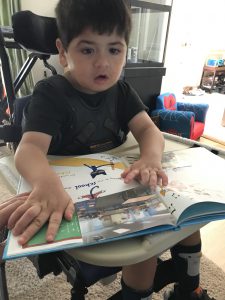 Joey and I have been working on reading predictable pattern books that are typically introduced at this time of year in kindergarten. Joey is doing well with these books, and shows an understanding of using the words and pictures to recognize unfamiliar words. It’s exciting to watch him grow in these abilities, but there are certainly challenges that arise from making sure Joey has appropriate access to leveled reading materials.
Joey and I have been working on reading predictable pattern books that are typically introduced at this time of year in kindergarten. Joey is doing well with these books, and shows an understanding of using the words and pictures to recognize unfamiliar words. It’s exciting to watch him grow in these abilities, but there are certainly challenges that arise from making sure Joey has appropriate access to leveled reading materials.
One challenge is simply selecting the right books for him. I like to use a computer program from Pioneer Valley that lets you put the child’s name into the book. It gives the child at least one firm, known word, and who doesn’t like reading a book about themselves? Yet, when I first began with these books, I realized Joey didn’t have his name on his device. He could say the phrase “My name is Joey”, but couldn’t just say “Joey.” I had to cross out Joey and write “I” over each word. (Joey was quickly added and he can now read his own name, and is working on saying it!).
Another challenge has been finding books that have words that are on his device already. This week I brought a book to practice high frequency words, only to realize that the main word, “here” on each page isn’t on Joey’s device yet. We can read it together and take turns with the words, but it is not the same as providing Joey with a book he can read independently.
There is also the matter of finding appropriate books. Because I can put a name into the book, the book may say “Joey is swimming. Joey is running”. Making him read a book about himself swimming, running, or jumping seems very wrong. I can put his brother’s name into the book, but that too seems a bit unfair.
More than anything though, I can tell how quickly he tires from reading. Unlike just learning words on his device and exploring new vocabulary, now he has to be careful with exactly which words he selects. When he is just speaking, he can use words that are similar in meaning to another word if he can’t remember where to find it, or if he is having difficulty getting his eyes to focus on one specific word. With reading, he needs to match the word exactly. Once we finish with one of these books, Joey is exhausted. If I take a ten minute language data sampling after we’ve read, Joey will say only around 11 words, when before the book, he may say up to 30 or 40 words. Over the last few weeks I’ve seen Joey’s stamina grow for selecting high frequency words and reading print on the page. Still, what is a two minute book for a typically developing child, is a ten minute struggle for Joey – not because of difficulty recognizing the words – but just the attempts at finding each word to make a sentence.
I struggle with this, because I see Joey’s potential, and continually am surprised by how fast he is learning to recognize high frequency words. I don’t want to exhaust him, frustrate him, or make him hate reading, but I also don’t want to lower my expectations and have him not get access to the grade level reading standards I think he is capable of. I am continuously looking into new ways to support his reading development that will maintain the high standard without overwhelming him.


